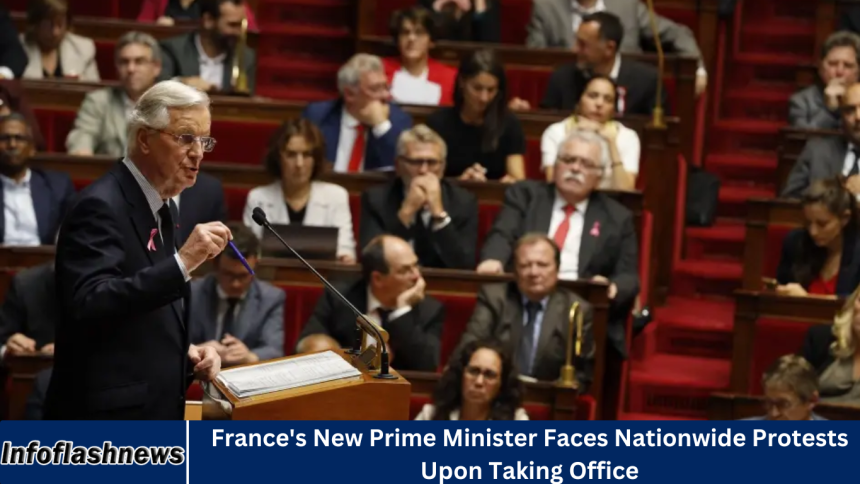In a dramatic turn of events that underscores the deep political divisions in the country, France’s newly appointed Prime Minister has been met not with applause, but with widespread protests across the nation.
From Paris to Marseille, from students to union workers, thousands have taken to the streets in what is being described as a “block everything” movement. This eruption of unrest paints a complex picture of France’s current political climate and the public’s growing frustration with the government.
This article dives deep into the causes of the protests, the public’s reaction, the profile of the new Prime Minister, and what these demonstrations could mean for the future of French politics.
More Read: Qatar Bombing Puts Trump-Netanyahu Alliance to the Test
Who Is France’s New Prime Minister?
The new French Prime Minister, [Insert Name], was appointed in September 2025 by President Emmanuel Macron (or insert new president, if applicable depending on current data).
Seen by the establishment as a technocratic leader with experience in administration and economic reform, the appointment was intended to signal stability and continued reform in the final years of Macron’s presidency.
However, the choice has proven controversial. Critics argue that the new Prime Minister lacks the grassroots connection to ordinary citizens and represents the very political elite many French citizens have grown to distrust.
The administration’s focus on economic liberalization, pension reform, and labor law changes has made it a lightning rod for criticism, especially from left-wing parties, trade unions, and youth activists.
Why Are French Citizens Protesting?
1. Economic Inequality and Living Costs
One of the major grievances behind the current protests in France is the rising cost of living. Inflation in 2025 has remained stubbornly high, and many families are struggling with increased costs for energy, housing, and food. Despite governmental assurances, citizens feel that wages are not keeping pace with inflation, leading to a sharp decline in purchasing power.
The protesters accuse the government of being out of touch with the daily struggles of average people. “They keep talking about GDP and economic reforms, but we’re worried about how to pay our electricity bills,” said a protester in Lyon.
2. Controversial Pension Reforms
The French government’s plan to raise the retirement age and adjust pension calculations has also reignited long-standing tensions. In early 2023, massive strikes and protests broke out over pension reform. Although the reform was passed, it left a lingering sense of betrayal among the working class.
With the new Prime Minister expected to push for further reforms, unions and opposition leaders have called for preemptive resistance, viewing the recent appointment as a green light for more unpopular measures.
3. Labor Law Changes
Trade unions have also voiced alarm over expected changes to French labor laws, which aim to make hiring and firing easier for employers. While the government argues these reforms are necessary to boost economic growth and reduce unemployment, workers see them as attacks on job security.
The CGT (General Confederation of Labour) and FO (Workers’ Force) unions have been at the forefront of organizing strikes and rallies, calling the labor proposals “a direct assault on the rights of the working class.”
The “Block Everything” Movement
One of the most distinctive features of the recent protests has been the slogan: “Bloquons Tout” — translated as “Block Everything.” This slogan encapsulates the strategy adopted by demonstrators: disrupt transportation, halt business, and paralyze government functions.
Transportation Shutdowns
Major highways, train stations, and public transportation systems have been blocked or severely disrupted. In Paris, demonstrators clashed with police as they attempted to shut down Gare du Nord, one of the busiest railway stations in Europe.
Flights were canceled, and school schedules have been thrown into chaos as teachers joined the strikes. Truckers have parked their vehicles on highways to block entry into major cities, and garbage collectors in several municipalities have gone on strike, leading to sanitation concerns.
University and School Walkouts
Student groups across the country have organized walkouts and sit-ins, with many universities suspending classes indefinitely. Their message is clear: the younger generation is not willing to accept a political future shaped by leaders who, in their view, do not represent their interests.
Digital Mobilization
Protesters have utilized social media platforms like Twitter (X), Instagram, and TikTok to organize, share live updates, and coordinate flash protests. Hashtags such as #FranceEnColère (France in Anger) and #BloquonsTout have trended for days, drawing international attention.
Government Response: Calls for Calm, But No Concessions
The French government has so far taken a firm stance, defending the appointment of the new Prime Minister and reiterating its commitment to reform.
In a televised address, the Prime Minister stated:
“Change is always difficult. But reform is necessary if France is to remain strong and competitive in the modern world. We understand the concerns of the people, but we will not allow disorder to prevail over democracy.”
Interior Minister [Insert Name] has authorized the deployment of riot police in major cities, leading to several confrontations. Human rights organizations have raised concerns over alleged police brutality, and legal challenges have already been filed in response to the detention of protest leaders.
International Reaction
The unrest in France has drawn attention from around the globe. European leaders have expressed concern over the political instability in one of the EU’s largest economies.
Markets responded with a dip in the French stock exchange, as investor confidence was shaken. Some analysts suggest that prolonged unrest could impact France’s economic recovery efforts, especially as the Eurozone faces continued geopolitical and financial headwinds.
Meanwhile, foreign media have drawn parallels between the French protests and wider global movements against political elitism, rising inequality, and distrust in democratic institutions.
Opposition Parties Seize the Moment
Left-wing opposition parties, particularly La France Insoumise and parts of the Socialist Party, have voiced support for the protesters. Far-right figures have also attempted to capitalize on the unrest, though most protest leaders have explicitly distanced themselves from extremist affiliations.
In Parliament, opposition leaders are demanding a vote of no confidence in the new Prime Minister, although the government’s majority makes such a motion unlikely to succeed. Still, the protests have emboldened political challengers, many of whom are now calling for snap elections.
A Historical Pattern of Protest in France
Protests are deeply ingrained in French political culture. From the May 1968 student uprisings to the more recent Yellow Vest (Gilets Jaunes) movement, France has a long tradition of civil resistance as a tool for shaping government policy.
Political analysts argue that this latest wave of unrest is part of that same tradition — a sign not of a collapsing system, but of a deeply engaged citizenry unwilling to passively accept political decisions.
“In France, protest is not an exception. It’s a form of communication with the state,” said political scientist [Insert Expert Name] from Sciences Po University.
What Happens Next?
The coming weeks will be crucial for the future of the new Prime Minister and the direction of the French government.
Possible Outcomes:
-
Negotiation and Compromise: The government may be forced to soften or delay its reforms in the face of continued resistance.
-
Escalation: If protests intensify, they could spiral into a broader political crisis.
-
Resignation or Reshuffle: Although unlikely in the short term, mounting pressure could eventually lead to cabinet changes or even a leadership resignation.
Much will depend on whether the protests maintain momentum and whether other sectors — such as healthcare, transportation, or the judiciary — join the movement.
Frequently Asked Question
Why are French citizens protesting the new Prime Minister?
French citizens are protesting due to concerns over the new Prime Minister’s expected policies, particularly regarding pension reform, labor law changes, and rising living costs. Many see the appointment as a continuation of unpopular economic reforms, sparking public outrage across various social and economic groups.
What is the “Block Everything” movement in France?
The “Block Everything” movement (French: Bloquons Tout) is a nationwide protest strategy aimed at paralyzing daily life in response to government actions. Protesters are blocking roads, disrupting public transport, and organizing strikes in schools and workplaces to pressure the government into reversing planned reforms.
Who is the new Prime Minister of France in 2025?
As of September 2025, [Insert Name] was appointed as the new Prime Minister of France. The appointment was made by President Emmanuel Macron (or successor if applicable), with the goal of pushing forward reforms in the face of economic and social challenges. However, the decision has sparked widespread backlash from the public.
What reforms is the new French Prime Minister planning?
The new Prime Minister is expected to pursue economic liberalization, including:
- Raising the retirement age
- Reforming labor laws to ease hiring/firing
- Streamlining public sector services
These proposals have angered unions, students, and opposition parties, leading to nationwide demonstrations.
How are unions involved in the protests?
Major French trade unions like CGT and FO are heavily involved in organizing the protests. They have called for general strikes, work stoppages, and rallies across the country. Union leaders argue the new government threatens worker rights and social protections.
Has the government responded to the protests?
Yes, the French government has responded by defending the appointment and reaffirming its reform agenda. Officials have called for calm and warned against violence, but they have not made significant concessions. Riot police have been deployed in major cities to manage public disorder.
Could these protests lead to political change in France?
While it’s too early to predict the outcome, sustained nationwide protests have the potential to:
- Delay or block reforms
- Weaken the current government
- Spark a vote of no confidence or even a cabinet reshuffle
French history shows that mass mobilization often leads to political consequences, making the situation one to watch closely.
Conclusion
The appointment of France’s new Prime Minister was meant to usher in a period of renewed stability and reform. Instead, it has triggered a wave of nationwide protests that reflect deeper societal divisions, economic concerns, and political fatigue. As the streets of France remain filled with demonstrators chanting “block everything,” the government faces a critical decision: engage with the public’s concerns or risk deepening the crisis. The world is watching. And as history has shown, when France protests — change often follows.














